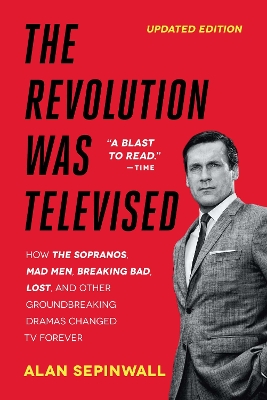Reviewed by jamiereadthis on
Not that it’s 1-for-12 though. (Or 4-for-12, or 8-for-12.) Even the dramas that might not interest me in and of themselves, it’s interesting to learn their time and place and context— in other words, to learn the 110 reasons they should never, ever have been created, produced, aired, or watched. The recurring theme of the book: how every success in it was a fluke at best and more accurately, the straight-up defiance of all convention and logic. Ron Moore of Battlestar Galactica, the Battlestar that would stand less of a chance of getting made today than ten years ago, closes out the final chapter with this observation: “You can almost guarantee that the success story of the next great show will be one of ‘Nobody believes in us, the network hated it, it tested like shit, they all wanted to cancel it, and sure enough, it became an enormous hit.’” Over and over again.
Happy accidents, misbegotten experiments, I don’t care. I’ll take ‘em all.
Some stray thoughts:
- Here’s my favorite anecdote (of course): the mind-blower over the completely different Shield we almost got because Kevin Reilly at FX wanted Walton Goggins fired after the pilot. “[Shawn] Ryan argued successfully for his guy, and by the time Season 5 ended with [goddamn it —Jamie’s note] a tearful Shane killing Lem with a grenade to keep Kavanaugh from breaking him, Goggins had more than justified his boss’s faith. As a result, the final two seasons didn’t need a Very Special Guest Star: with Goggins now playing at Chiklis’s level, there was no conflict the show could create that would be bigger, or hit harder, than Vic vs. Shane, mentor against protégé, brother against brother.” And this from the show that, Sepinwall says in the next paragraph, “is not only lacking a sore-thumb season; it’s the only one of the great millennial dramas whose last season many fans would be likely to name as the show’s best.”
- (Eight years later, of course, John Landgraf of FX and everyone of FX and everybody involved in the show and everybody watching the show and even Elmore Leonard himself is resurrecting Boyd from the pilot because there’s just no way they’re doing Justified without Walton Goggins. Redemption.)
- Vic Mackey and Jack Bauer: it tickles me how they get branded as Vic the corrupt cop and Jack the American hero. Um, let’s compare some spreadsheets here.
- On Battlestar, the line that made me laugh: the tightrope walk of the studio’s concern about darkness and “David and Ron wanting to basically drown babies at every turn.” They were trying to stay true to the tone of the show, “which was going to drown babies. It just was.”
- I really want to see the S1 Breaking Bad that AMC deemed had “too much story.” I really want to see any show that AMC deems has too much story.
- (Meaning one of my favorite tweets from Dan Harmon is not only funny but kind of true: “There must be a guy at AMC that stops you after one sentence of your pitch and says, ‘whoa whoa, save some of this for season two!’”)
- This footnote at the end: the thanks to Ted Griffin, who “helped give this book a much better title than he gave his own show, Terriers.” Terriers, forever.
Reading updates
- Started reading
- 27 July, 2013: Finished reading
- 27 July, 2013: Reviewed
